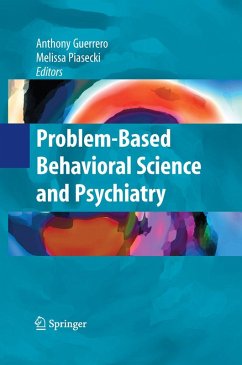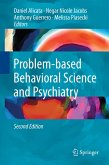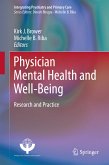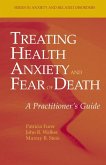Problem-Based Behavioral Science and Psychiatry
Edited by Anthony Guerrero, University of Hawaii, Honolulu
Melissa Piasecki, University of Nevada, Reno
In keeping with the growing emphasis on psychiatry in the medical school curriculum, problem-based learning (PBL) offers students a unique patient-centered, multidisciplinary approach to study and the synthesis of knowledge. The first text fully consistent with PBL models and methods, Problem-Based Behavioral Science and Psychiatry is a clinically robust resource for both the medical and the behavioral science student. Over 40 contributors, many themselves graduates of PBL medical schools, apply problem-based learning methods to specific psychiatric disorders, general clinical issues, and bedrock physician skills such as the intake interview and treatment planning.
The book's fictional case vignettes illustrate typical patient scenarios, providing real-world context for content areas, and accompanying case diagrams show the relationships between patient behavior and underlying neurobiological structures. Each student-friendly section ends with helpful review questions.
A sampling of the content areas covered:
This book makes an excellent prep/review text for psychiatry residents preparing for the USMCE Step 3 exam and third- and fourth-year medical students preparing for the USMLE Step 1 and 2 exams, as well asbeing suited to graduate students in psychology or clinical social work. Problem-Based Behavioral Science and Psychiatry encourages lifelong learning and helps build the foundation for a lifelong career.
Edited by Anthony Guerrero, University of Hawaii, Honolulu
Melissa Piasecki, University of Nevada, Reno
In keeping with the growing emphasis on psychiatry in the medical school curriculum, problem-based learning (PBL) offers students a unique patient-centered, multidisciplinary approach to study and the synthesis of knowledge. The first text fully consistent with PBL models and methods, Problem-Based Behavioral Science and Psychiatry is a clinically robust resource for both the medical and the behavioral science student. Over 40 contributors, many themselves graduates of PBL medical schools, apply problem-based learning methods to specific psychiatric disorders, general clinical issues, and bedrock physician skills such as the intake interview and treatment planning.
The book's fictional case vignettes illustrate typical patient scenarios, providing real-world context for content areas, and accompanying case diagrams show the relationships between patient behavior and underlying neurobiological structures. Each student-friendly section ends with helpful review questions.
A sampling of the content areas covered:
- Childhood development and brain development.
- Major psychological illnesses, including personality, mood, anxiety, and psychotic disorders.
- Stress, substance abuse, and violence.
- Eating, sleep, and sexual disorders.
- Coping skills and treatment compliance.
- End-of-life care.
- PLUS chapters on cultural sensitivity, ethical concerns, and the physician/patient relationship.
This book makes an excellent prep/review text for psychiatry residents preparing for the USMCE Step 3 exam and third- and fourth-year medical students preparing for the USMLE Step 1 and 2 exams, as well asbeing suited to graduate students in psychology or clinical social work. Problem-Based Behavioral Science and Psychiatry encourages lifelong learning and helps build the foundation for a lifelong career.
Dieser Download kann aus rechtlichen Gründen nur mit Rechnungsadresse in A, B, BG, CY, CZ, D, DK, EW, E, FIN, F, GR, HR, H, IRL, I, LT, L, LR, M, NL, PL, P, R, S, SLO, SK ausgeliefert werden.
From the reviews: "This book discusses problem-based learning (PBL) methods and how to apply them when learning behavioral science and psychiatry. ... written for medical students and other students studying psychiatry and behavioral science. I would include anyone interested in PBL methods, as they may find it interesting as a way to learn about this technique. ... Each chapter has an extensive bibliography. ... A comprehensive index ends the book. ... for those who wish to learn about this teaching approach, this is a good book." (William Miles, Doody's Review Services, January, 2009) "...this unique book first provides cases to use as teaching tools and then ... emphasizes the use of problem-based learning methods to master the contents of teaching. ...an interesting and important book for teaching the principles of behavioral science and psychiatry. Unique in its presentation and format, the book is an excellent alternative for teachers of medical students, residents, and fellows. It is an important addition to the many texts discussing psychiatry in primary care medicine and general hospital psychiatry, as well as a useful volume for beginners attempting to master an understanding of this complex discipline of medicine. The authors have offered an innocative case method approach as a teaching paradigm from which teachers have much to gain." (James J. Strain, MD, J Clin Psychiatry 70:8, August 2009)









